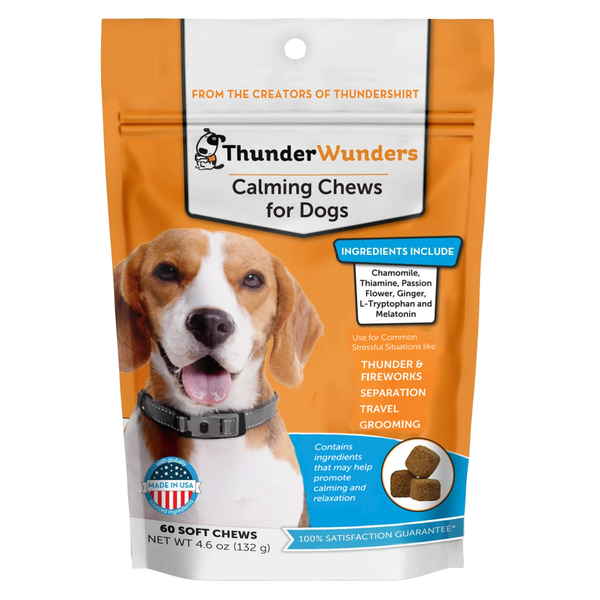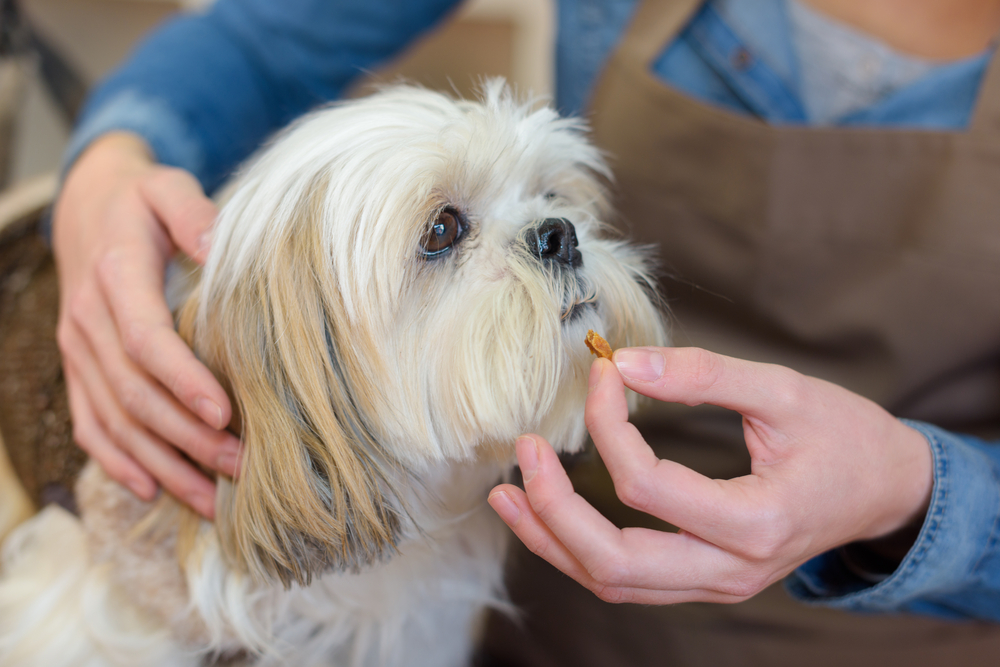6 Vet-Approved Supplements for Dogs with Cancer

All featured products are chosen at the discretion of the GreatPetCare editorial team and do not reflect a direct endorsement by the author or reviewer.
We add vitamins, minerals, and other supplements to our diets. So, adding immune-boosting and anti-inflammatory cancer-fighting supplements to your dog’s diet is a no-brainer, right? Yes and no, experts say. There’s a big difference between choosing supplements for dogs with cancer on an individualized basis in a strategic way, and just generally guessing and supporting what your dog’s needs are. That difference comes down to diagnostic testing and chatting with your veterinarian.
The bottom line—choosing supplements for dogs with cancer shouldn’t be a guessing game. With some help from vet experts, we’ve picked the best supplements for dogs with cancer. Of course, your pup’s specific needs are based on their diagnosis and chemical profile.
So, take a look at this round-up of cancer supplements for dogs, then ask your veterinarian if these supplements could support your dog’s health.
Our Top Picks
- Mushroom Supplement for Dogs with Cancer: NOW Pets Immune Support Chewable Tablets
- Supplement for Dogs with Inflammation: Ayush Herbs Inflammation Support
- Calming Aid for Dogs with Cancer: ThunderWunders Calming Chews
- Omega-3 Fatty Acid Supplement for Dogs with Cancer: Nordic Naturals Omega-3 Soft Gels for Pets
- Gut Health Supplement for Dogs with Cancer: Rx Biotic Powder
- Liver Support Supplement for Dogs with Cancer: Integrative Therapeutics Super Milk Thistle X
Benefits of Supplements for Dogs with Cancer

Supplements can be a great addition to your dog’s diet, but not all supplements belong in your pet’s dish. “In recent days, it seems almost every second owner has their pet on supplements, whether veterinarian-recommended or not,” says London-based locum veterinary surgeon Dr. Linda Simon, DVM.
She notes that supplements aren’t always the answer—and they’re not always necessary. Typically, pets meet their nutritional needs when eating a complete and balanced dog food. “For most animals, supplements are only needed when they have a diagnosed medical issue, such as cancer,” she says.
When it comes to dog cancer patients, common symptoms include inflammation, nausea, anxiety, and decreased energy—symptoms that could benefit from the addition of supplements made for pets. Types of supplements to consider include:
- Omega 3 fatty acids and turmeric (curcumin) for decreasing inflammation.
- Pre- and probiotics for improving gut health, boosting the immune system, and reducing inflammation of the digestive tract.
- Medicinal mushrooms for anti-cancer activity, relief of chemotherapy side effects, and longevity [1].
- Milk thistle for protecting the liver and other organs from harmful toxins.
- CBD, chamomile, and melatonin for calming pre-veterinary visit jitters.
But grabbing supplements off the shelf based on a blanket cancer diagnosis might not provide the results you’re looking for. For a targeted approach, work with your veterinarian to select the best supplement(s).
6 Vet-Approved Supplements for Dogs with Cancer
There are many options available when it comes to choosing supplements for dogs with cancer. And the best treatment depends on the age, diagnosis, and needs of your dog. Here are a few to ask your vet about:
Mushroom Supplement for Dogs with Cancer
Our pick: NOW Pets Immune Support Chewable Tablets

Your dog’s diagnosis and the target area will determine which mushroom provides the biggest benefit. Now Pets’ veterinarian-formulated mushroom supplement features a proprietary blend of eight mushrooms that benefit everything from liver and kidney function to the immune system.
Mushrooms have two parts—the top which is the flowering body and the mycelium which is the root. The component giving your pet the biggest nutritional boost is a compound called beta-glucan, which is found in the top or fruiting body of the mushroom [2].
Other active ingredients include milk thistle extract, turmeric root extract, burdock root, licorice root, red clover, ashwagandha root extract, and selenium.
Highlights
- Veterinarian-formulated by Dr. Barbara Royal, DVM, CVA, founder of the Royal Treatment Veterinary Center
- Made with natural botanicals
- Improved flavor
- Carries the National Animal Supplement Council (NASC) Quality Seal
- 90 chewable tablets per bottle
Things to Consider
Based on where the cancer is located, what treatment a dog is undergoing, and their medical history—there are potentially different mushroom supplements that you want to reach for. So, ask your veterinarian if this combination of medicinal mushrooms is the right one for your pup.
The label says to use with caution in animals on steroids. Long-term use may cause or contribute to water retention, hypertension, and other cortisone-like side effects.
Supplement for Dogs with Inflammation
Our pick: Ayush Herbs Inflammation Support

When it’s general inflammation you want to tackle, consider a turmeric supplement. This option from Ayush Herbs features 97 percent pure curcuminoids and is formulated to help support a healthy inflammatory and metabolic response (already within a normal range). The product has earned a quality and safety certification from Emerson Ecologic’s Emerson Quality Program (EQP), which means it meets or exceeds current Good Manufacturing Processes (cGMP).
Highlights
- 97 percent pure curcuminoids
- Quality and safety certification from Emerson Ecologic’s Emerson Quality Program (EQP)
- Contains no milk, soy, egg, or wheat
- 90 tablets per bottle
Things to Consider
Turmeric supplements for dogs can be beneficial for general inflammation. However, gastrointestinal side effects may occur in some dogs. When targeting inflammation in a particular area, talk with your veterinarian about the right supplement for the job.
Calming Aid for Dogs with Cancer
Our pick: ThunderWunders Calming Chews

ThunderWunders calming chews for dogs can help promote rest and relaxation and alleviate stress. Made with naturally calming ingredients, including chamomile, melatonin, and L-tryptophan, your pup can feel at ease for the day ahead. These chews also contain ginger to help settle sensitive stomachs in stressful situations.
Highlights
- Ingredients include chamomile, thiamine, passion flower, ginger, L-tryptophan, and melatonin
- Made in the USA
- 100 percent satisfaction guarantee
- For dogs 12 weeks of age and older
- Comes in a 60-count bag
Things to Consider
Similar to some other supplements for pets, there haven’t been many studies of chamomile in animals. So, the evidence that it works is mostly anecdotal. L-tryptophan is an amino acid that increases serotonin levels in the brain. Before starting this supplement, ask your board-certified oncologist if your dog’s treatment works by creating free radicals and if this amino acid could interfere with treatment.
Omega-3 Fatty Acid Supplement for Dogs with Cancer
Our pick: Nordic Naturals Omega-3 Soft Gels for Pets

The best source of omega-3 fatty acids is small, cold-water fish (such as sardines and anchovies) that are less likely to bioaccumulate harmful toxins [3]. Sustainably caught, cold-water sardine and anchovy oils are exactly what you’ll find in every soft gel capsule of Nordic Naturals omega-3 supplement for pets. Formulated especially for furry friends, this fish oil is 90 percent triglyceride molecular form, meaning better absorption and easier digestion than similar products. Plus, this brand excels when it comes to rigorous testing and quality standards. That means fresh ingredients that meet purity standards.
Highlights
- 330 mg of omega-3 fatty acids in every capsule, including EPA and DHA
- Third-party tested and guaranteed purity
- Wild-caught ingredients
- Friend of the Sea certified
- GMO-free
- 90 soft gels per bottle
Things to Consider
Some pups aren’t fans of the soft gel form. But pet parents say the capsules make correct dosing a breeze—even if that means puncturing and squeezing the contents onto food.
Gut Health Supplement for Dogs with Cancer
Our pick: Rx Biotic Powder

Clinical research shows that the gut is its healthiest when pre- and probiotics work together [4]. Probiotics are beneficial microorganisms that normally live in your dog’s intestines, but stress, a bout of illness, or antibiotics can disrupt the balance of good and bad bacteria. Once established, the good bacteria will need something to consume so that they may continue thriving. That’s where prebiotics (fermentable fibers) come in.
“Fermentable fibers are known to have health benefits across many species,” Dr. Sarah Machell, DVM, medical director of Vetster says. “Some of these identified benefits include better bowel movements, enhancement of gut bacterial flora, and an increased generation of short-chain fatty acids (SCFA).” Dr. Machell notes that SCFAs are particularly important to gut health for their anti-inflammatory and anti-cancer properties.
Rx Biotic Powder for Dogs and Cats features four major probiotic bacterial strains and two prebiotics to help support healthy digestive and immune systems.
With almost 70 percent of a dog’s immune system tied to the gastrointestinal tract, the gut is an important aspect of overall health and well-being [5]. So, don’t miss chatting with your veterinarian about this powder supplement.
Highlights
- Balanced probiotic and enzyme support supplement
- Highly palatable, high potency, hypo-allergenic powder with no flavorings or additives
- Carries NASC Quality Seal
- Comes in a 60-gram or 35-gram bottle
Things to Consider
For therapeutic use, you may need to give 2-4 scoops daily with food. Refrigeration is recommended after opening.
Some popular probiotics for dogs contain beta carotene or vitamin E. While these compounds are healthy antioxidants for most dogs, they could interfere with some cancer treatments. So, check labels carefully, then chat with your veterinarian before starting your dog on any probiotic and prebiotic—or any other supplement.
Liver Support Supplement for Dogs with Cancer
Our pick: Integrative Therapeutics Super Milk Thistle X

Silymarin—a chemical found in milk thistle—is a powerful protectant that can reduce the toxic effects that chemotherapy and other treatments may have on the liver and kidneys. Integrative Therapeutics combines a highly absorbable form of milk thistle with other supportive herbs, including artichoke leaf, dandelion root, licorice root, and rhizome extracts, for this well-rounded liver support supplement.
Highlights
- No sugar, salt, yeast, wheat, gluten, corn, dairy products, or ingredients of animal origin
- No artificial coloring, flavoring, or preservatives
- Adheres to the highest manufacturing standards
- 120 capsules per bottle
Things to Consider
While milk thistle is generally safe for therapeutic use in dogs, this particular supplement is formulated for humans, so you’ll need to check with your veterinarian first to see if it’s appropriate for your individual pet. If your vet approves, use caution and follow their dosing recommendations and instructions.
Supplements for Dogs with Cancer: Buyer’s Guide

The number of supplements to choose from can be overwhelming. To narrow down the best choices, it’s important to keep a few things in mind:
Your dog’s diagnosis and treatment plan. Dogs can develop different types of cancer with different symptoms. Just like in humans, cancer can affect different parts of the body and require varying treatment or management plans. That means that there’s no one-size-fits-all approach to supplements for canine cancer.
Veterinary approval. Always consult your veterinarian, board-certified oncologist, or board-certified veterinary nutritionist before adding a new supplement to your dog’s diet.
Supplement form. Supplements for dogs with cancer come in many forms, such as powders, capsules, chews, and liquid drops. Your dog could lose their appetite or sense of smell, making supplementing difficult. So, consider your individual dog’s preferences and temperament when choosing a form and prepare to be flexible as their treatment or management progresses.
Active ingredients. Read the packaging to see the product’s active ingredients and potential health benefits. Some active ingredients could interfere with medications or other treatments. So, always discuss any changes to your dog’s diet with your pet’s medical team before starting a new supplement.
Quality. Third-party testing, GMP-certified, NSF-certified, and a seal of the NASC all tell you that you’re buying a quality supplement. When requested, reputable companies can provide a certificate of analysis.
Dog Cancer Supplements: Precautions and Tips

As a general rule, it’s always best to check with your veterinary team before adding any additional foods or supplements to your pet’s diet. It might surprise you to find that some minerals and nutrients could interfere with your dog’s cancer treatment.
For example, avoiding antioxidants such as beta carotene and vitamin E is the safest bet for dogs receiving radiation treatment or chemotherapy that works by creating free radicals [6].
Dr. Joseph Impellizeri, DVM, DACVIM, MRCVS, is a board-certified oncologist at URvet Care and heads the Barrymore Center for Advanced Cancer Therapeutics. He’s a proponent of using supplements for dogs with cancer but heeds one last and very important warning:
“Never let the use of supplements override the standard of care.” Supplements are complementary to conventional care and treatment, he says. “Nutrition is just one pillar of health stability.”
References
- Vetvicka, Vaclav, et al. “Effects of Medicinal Fungi-Derived β-Glucan on Tumor Progression.” Journal of Fungi, vol. 7, no. 4, Mar. 2021, p. 250. Crossref, https://doi.org/10.3390/jof7040250.
- Vetvicka, Vaclav. Unrestricted Educational Grant from Nutramax Laboratories Veterinary Sciences, Inc., 2019, Effects & Benefits of Beta-Glucan, https://files.brief.vet/2019-02/CN_2019_Nutramax_March_F_SF%20(1).pdf. Accessed 10 Nov. 2023.
- Bioaccumulative Persistent Chemicals. https://www.michigan.gov/-/media/Project/Websites/mdhhs/Folder2/Folder27/Folder1/Folder127/Bioaccumulative__Persistent_Chemicals_FINAL.pdf?rev=17c45be4398546268a90de04f50f25e4. Accessed 10 Nov. 2023.
- Wortinger, Ann. “Prebiotics and Probiotics for Dogs and Cats.” Today’s Veterinary Nurse, 28 Feb. 2019, todaysveterinarynurse.com/nutrition/prebiotics-and-probiotics-for-dogs-and-cats/.
- “The Power of Probiotics.” Cornell University College of Veterinary Medicine, www.vet.cornell.edu/departments-centers-and-institutes/riney-canine-health-center/health-info/power-probiotics. Accessed 10 Nov. 2023.
- Moss, Ralph W. “Do Antioxidants Interfere with Radiation Therapy for Cancer?” Antioxidants and Radiation Therapy, Cancer Communications, 2007, journals.sagepub.com/doi/pdf/10.1177/1534735407305655.









